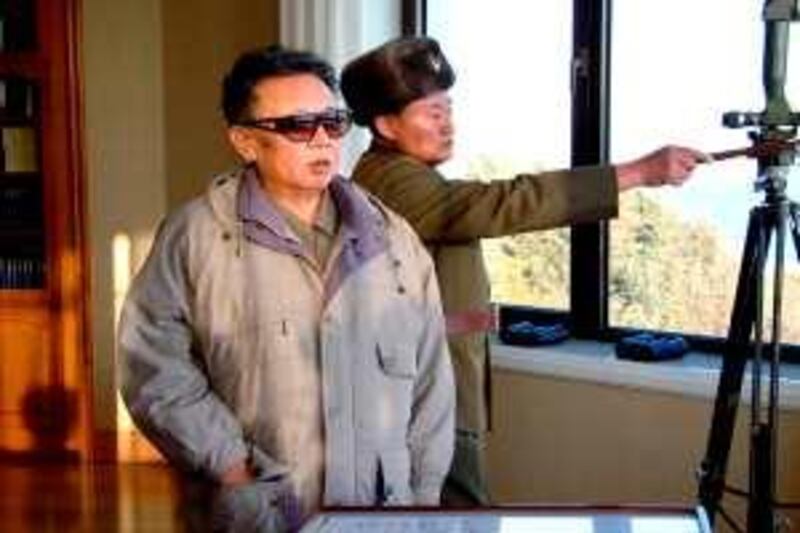In May, North Korea submitted 18,000 pages of records to the United States detailing operations at its Yongbyon nuclear reactor complex. The actual sheets of paper were contaminated with highly enriched uranium, which the North has at various times affirmed and denied producing, according to US intelligence sources. It was the kind of theatre that has consistently portrayed the North in a bad light in nuclear negotiations with the United States; the secretive, Soviet-style state often seems to prefer to be seen as threatening.
Perhaps an exception is Pyongyang's most recent New Year address, in which it refers to "the independent foreign policy of our Republic to denuclearise the Korean Peninsula and defend peace and security of Northeast Asia" and that the party "will develop relations with the countries friendly towards us". It was an ambiguous olive branch, at best, extended to the incoming Obama administration, but a departure from the standard grist of KCNA, the state news agency. The week before it issued reports titled "US War Hysteria Under Fire" and - amid worsening ties with South Korea - "Lee Myung-bak's Group Ulterior Intention Slammed", in reference to Seoul's relatively conservative prime minister. Another report was "Floral Basket to Kim Jong Il".
Pyongyang's leaders might not always be the best at burnishing their image in the international media, but from their perspective their actions in nuclear negotiations make a certain amount of sense. "North Korea does not trust the leaders in Washington DC, which is not groundless," said Paik Hak-soon, the director of the Center for North Korean Studies at the Sejong Institute, a think tank in South Korea. "They were a target of removal, the axis of evil, which means that negotiations have never given North Korea the opportunity to prove that it is a partner with a constructive plan to deal with the issue."
The most recent six-party talks broke down over the latest in a series of disagreements on verification procedures. Both sides accused the other of deceit and the United States enacted a freeze on fuel shipments as a result. Washington said the freeze was agreed to by South Korea, Japan, China and Russia, something Moscow denied the same day. The impasse followed relatively promising developments; last summer the North destroyed a symbolic cooling tower at the Yongbyon reactor complex and, in October, the United States removed North Korea from its list of state sponsors of terrorism. The latter move was significant to Pyongyang, according to Mr Paik, but the details of the negotiations are technicalities against the backdrop of US policy.
"By a very strict verification protocol, the negotiators of the United States, the hardliners, demanded they have to confirm even the absence of the undeclared materials and related activities. North Korea thought that very kind of strict demand was just tantamount to regime change." It may not even be foreign affairs that threatens regime stability the most. While current straits are not as dire as the mass famine a decade ago, people are dying of starvation and the North depends on food aid and economic co-operation from South Korea, China and the United States - a difficult balancing act for a state that espouses the ideology of juche, or self-reliance.
The disarmament talks are based on a concept of reciprocity, whereby the North is meant to denuclearise in return for security and diplomatic guarantees as well as economic and energy aid. The atomic programme is not its only bargaining chip - given significant conventional military capability, not to mention international concern over the welfare of its citizens - but it certainly is the most prominent.
"It is a strategic weapon, not a conventional weapon," said Phillip Paik, a professor at the University of North Korean Studies in Seoul. "It's the last card basically in order to deal with the United States or even get recognition from the United States. Now they have a nuclear weapon which the United States cannot overlook, so I think their strategy is working." Mr Paik, of the Sejong Institute, expects some progress to be made when the next administration comes into office, similar to the rapprochement during the Clinton years which culminated in the US-North Korea joint communique on security in 2000 and the visit of Madeleine Albright, the then secretary of state, to Pyongyang in October of that year.
But the situation has changed in eight years, not least because of the North's nuclear test in 2006, which observers characterised as a partial success. Pyongyang may be glad to see George W Bush's back, but will not be overly willing to make substantive concessions to Barack Obama. "It's going to take a considerable amount of time to get the talks back on track and it gives North Korea an opportunity to continue working on their programme," said Daniel Pinkston, a senior analyst with the International Crisis Group, a think tank. "I think they've made considerable progress. The longer they have weapons, if in fact they have weapons, they become more valuable.
"This is going to take a while and it might not ever be successful at all." @Email:jschertz@thenational.ae





